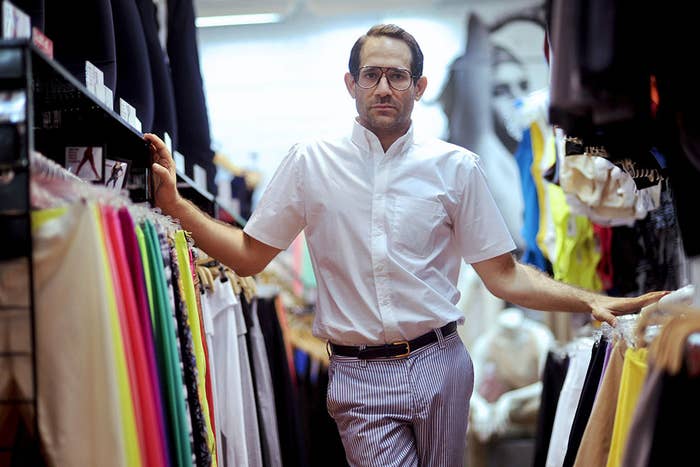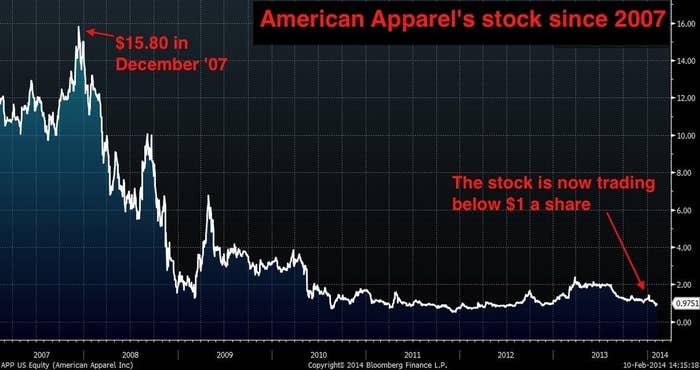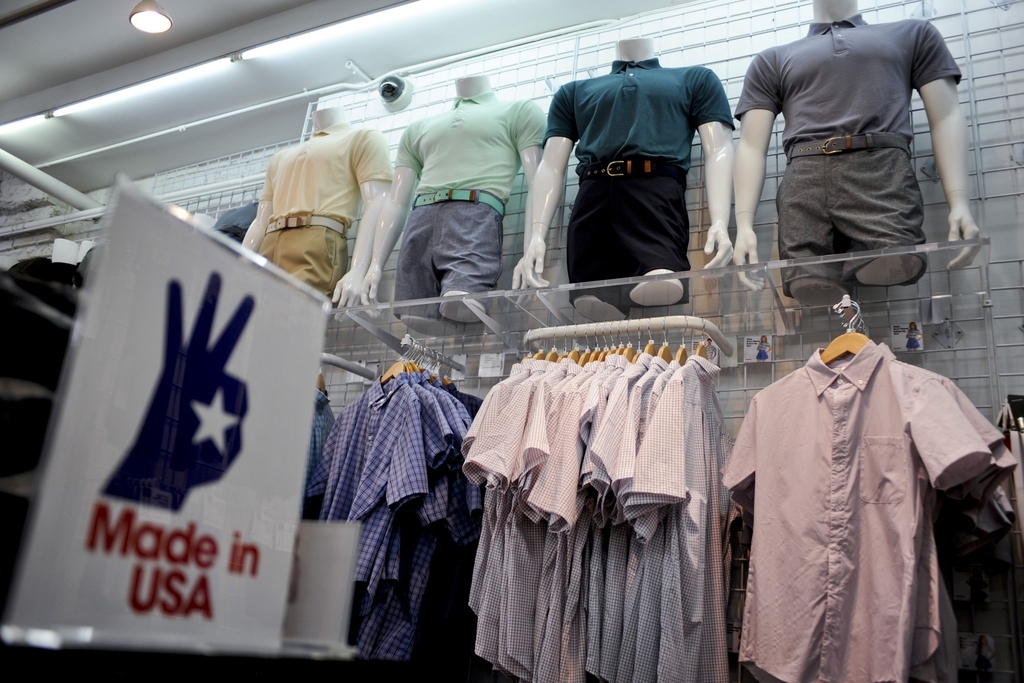
Dov Charney's three-legged dog is missing.
The American Apparel chief executive officer is 40 minutes late for an interview at the company's headquarters in downtown Los Angeles to talk about making clothes in America and the merits of being a public company. But right now the focus is on finding Marcel. So Iris Alonzo, a creative director who's also an assistant of sorts to Charney, apologetically asks for a venue change to the CEO's home in Echo Park while he continues his search — the dog belonged to an employee until recently, she explains.
When we pull up to the concrete mansion, Charney is out of breath but with good news: He just recovered the pointy-eared pup from a neighbor's yard, remaining limbs intact. The front yard where he greets us is strewn with ornaments of giraffes, though when asked if he likes the animal, Charney is confused by the question.
As quickly as one problem is solved, another one emerges: Charney is now occupied with figuring out how to transport a tall, thin female employee lingering outside with him back to the factory. He muses she might try Uber, but then lights up. Why not jump his beige Cadillac that's been sitting unused in the driveway? Excitedly, he calls for the housekeeper, who is bringing Marcel indoors, to get jumper cables then leaves them to it.
Moments after sitting down in the living room, there's a loud, grinding noise, presumably from the newly revived car. Charney leaps up and runs outside.
"Whoa, whoa, whoa, whoa, whoa," he exclaims. "What did you guys do? Did you hear that noise? Hear it?"
There's a brief exchange; the phrases "fuck Uber" and "give her $100 from my roll for gas" are audible. He returns after a few minutes, finally ready to talk.

"You really couldn't judge Steve Jobs the day he was thrown out of the office, you know?"
This is, if anything, a somewhat mellowed Dov Charney. After all, the scruffy, dark-haired CEO is now 45. He founded American Apparel in 1997, and over the last 17 years has built an extraordinarily recognizable brand that generates more than $600 million in sales a year.
But over the last five years, the financial story at American Apparel has been less than rosy. The retailer has been hit by almost everything that can go wrong for a corporation — an immigration raid in 2009; the resignation of its auditor in 2010; embarrassing lawsuits from former employees, shareholders, even Woody Allen; and a transition to a distribution center that was so disastrous that fixing it required Charney to live there for months. While the company was able to avert bankruptcy three years ago, it hasn't posted an annual profit since 2009, and analysts expect another loss for 2013. As a result, its stock has plunged drastically, closing below $1 every day last week.
Yet Charney, who owns almost half the company's shares, is unflaggingly optimistic about American Apparel's future. He says its 247 stores could be 20% more productive with the right tweaks, the online business could double, wholesale could grow by 20% to 30%. It could even develop a $100 million third-party retail business, selling items like American Apparel nail polish at drugstores or having hooded sweatshirt blowout sales at Costco, and is doing the research on such a venture now, he says.
When asked if American Apparel might finally turn a profit in 2014, however, Charney lets slip a little more than he probably should.
"Well, there's different ways one defines profitability — from a GAAP point of view, don't expect us to be profitable, but from an EBITDA point of view versus interest…" Charney says, referring to different accounting methods, before suddenly catching himself. "I really can't speak to that actually right now, it would be unprofessional, it would result in a whole bunch of problems for both of us, so I can't really say that. But I do intend to focus on improving the profitability of the company, and I'm excited about our prospects for this year, and I will publicly disclose our projections soon to the market."
While American Apparel's stock is well off its high of $15.80 in 2007, Charney's not obsessing over the price on a day-to-day basis, choosing instead to take a "longer, broader point of view." He's also certain that it's better to be a public company, based on the ability to "get money from the public markets rapidly" over being privately owned, despite the retailer's constant financial issues. (Last week, Bloomberg News reported that bets American Apparel's stock will decline, known as short bets, have tripled since June, after what appeared to be a promising first half of 2013. The company hasn't yet disclosed when it will announce fourth-quarter results.)
"We'll see how the company performs over the next five, 10 years," Charney says. "You really couldn't judge Steve Jobs the day he was thrown out of the office, you know? We're at an early stage in our development."
Besides, analysts and journalists have a tendency to be short term in their thinking, he says.
"The stock market is a voting machine and eventually becomes a weighing machine at certain points in the trajectory of a company, and proof comes at the moment of weighing," he explains. "For example, when Facebook went public, they were saying, voting, they're like, 'Bury Mark Zuckerberg! We hate that guy!' But I was watching this morning a little web blurb on one of the finance blogs and they said, 'He is on fire.' And I said, I wish I could just take this video, put it in my pocket, and play it to everyone one year ago. And the same thing happened to Netflix."
While Charney has a point that attitudes toward company stocks and CEOs can be overly nearsighted in a day-trading world, American Apparel's problems aren't exactly new. And while he says he thinks ("though is not certain") the business could hit $1 billion in sales in three to four years, he said the same thing to Businessweek in 2005.

"I don't believe in made in U.S.A., really, but that's a secret."
Charney has gotten into trouble — massive, reputation-defining trouble — in past interviews, so I'd expected to meet him in a conference room surrounded by PR people rather than at his home with just Alonzo present. In 2008, for instance, American Apparel's CFO resigned after Charney called him a "complete loser" to the Wall Street Journal. Charney is still dogged by a 2004 Jane magazine profile in which he masturbated in front of the reporter. Beyond that, his reputation has been tarnished by sexual harassment lawsuits accusing him of a myriad of offenses such as sending explicit messages to employees and taking photographs of them while naked. Many of the lawsuits have been dismissed, but Charney has admitted to walking around the office in his underwear and to dating employees.
The CEO still thrives on his reputation for unpredictability, which is evident in most of American Apparel's provocative marketing tactics. Last month, the brand made headlines for creating mannequins with pubic hair — "I didn't author that project, it wasn't my doing, but I salute the humor in it," Charney says — and just last week it announced a 62-year-old as its newest lingerie model.
Outside of its racy ads, American Apparel is best known for manufacturing all of its soft T-shirts, hoodies, and other garments at its Los Angeles factories and paying workers there more than the minimum wage. It's headquartered in an enormous seven-floor warehouse where the corporate staff sits apart from, but on the same floors, as people sewing the clothing — a unique operation compared to most other retailers, which tend to make goods overseas at the cheapest price they can get. BuzzFeed made a video with footage of the factory to accompany this article.
The company heavily advertises its sweatshop-free, made in the U.S.A. ethos, which has drawn more attention since last year's tragic factory collapse in Bangladesh that killed more than 1,000 people.
So it's a surprise when Charney declares, "I don't believe in 'made in U.S.A.,' really, but that's a secret. You can say I said it's off the record, but then you can say I said it's off the record, and say it. Because it's 'off the record' hypothetically speaking, OK?"
What he means, he elaborates, is that he doesn't "believe" in international borders, adding that the Canadian–U.S. border is "garbage."
"My vision is a kind of America for everyone, like where people could come and go and it really doesn't matter where you make the product, it's about paying a fair wage — but right now, we have a kind of society with borders, and on one side of the border, people have money and on the other side of the border they don't," he says. "So Europe does, Africa doesn't. Right? Vietnam doesn't, Japan does. This is, like, all these lines. What we're trying to do is build a business that's very futuristic in the sense that we don't want to rely on these labor inequalities that are not going to be sustainable forever anyway."
"I don't have people bursting in my house yet telling me to take a hike."
And on that note, Charney says that he's still in the process of building American Apparel, despite the management concerns that have haunted the company for years.
"I don't have people bursting in my house yet telling me to take a hike," says Charney, who's also chairman of the company's board.
While Charney has previously said that he's open to stepping down from his CEO role once he has a management team that can take over, he bristles when pressed on the topic of succession planning. The founders of other retailers that have had trouble grooming replacements, like Lululemon and Abercrombie & Fitch, are much older than him, he says.
"Who else is in the founder-led companies that are big out there?" he asks. "Everybody's a 5 or a 6 or approaching a 7. I'm in my mid-forties so I'm building a team and I'm widening it, but I'm just cracking my knuckles and getting started. When I'm in my mid-fifties, I'm going to start looking at how to widen, you know, start passing on the torch completely. But right now, I'm just figuring where I want to drive the bus."
Is there anything he would change from the past few years? He thinks for a few seconds, then says with a laugh: "I'd rather have blonde hair, honestly."

